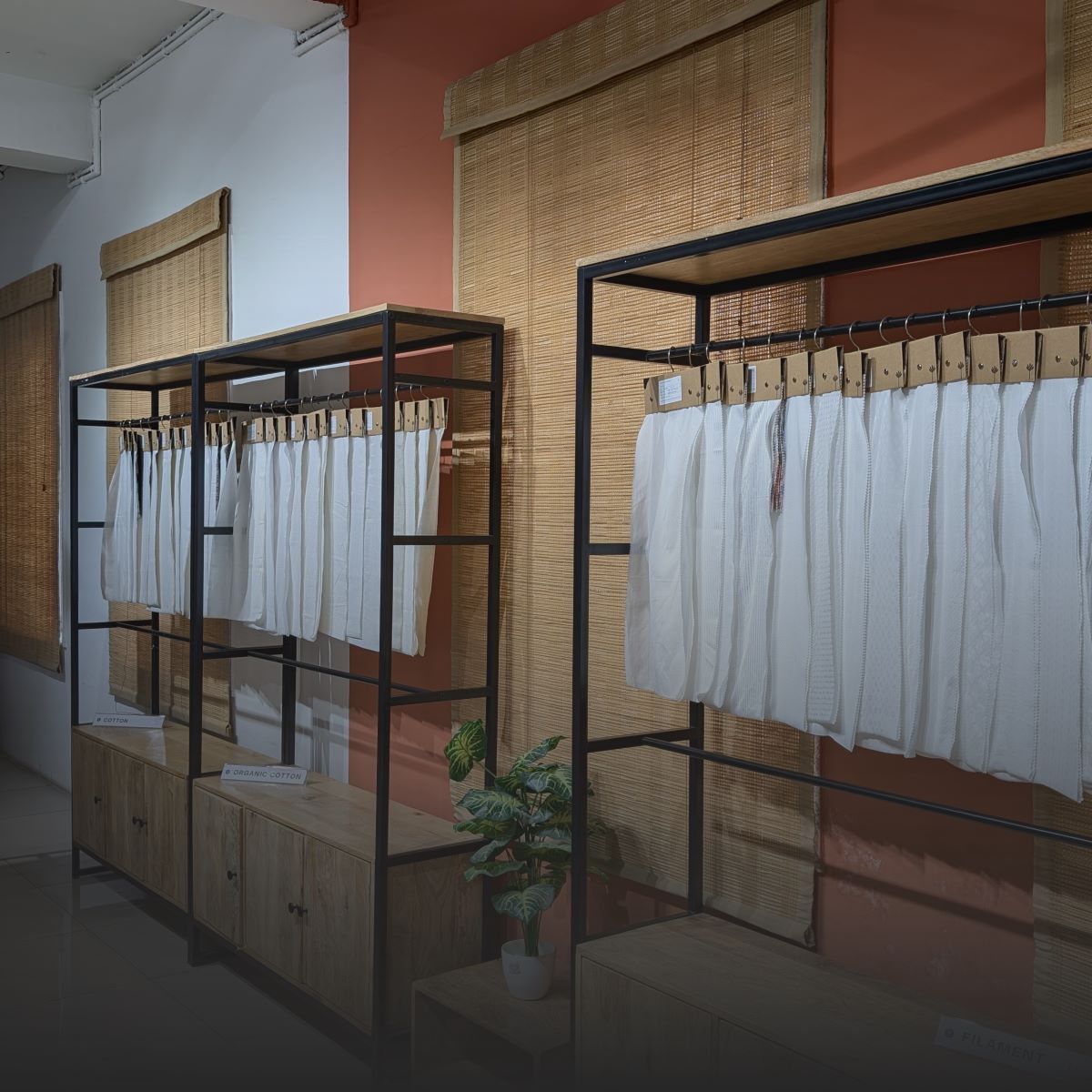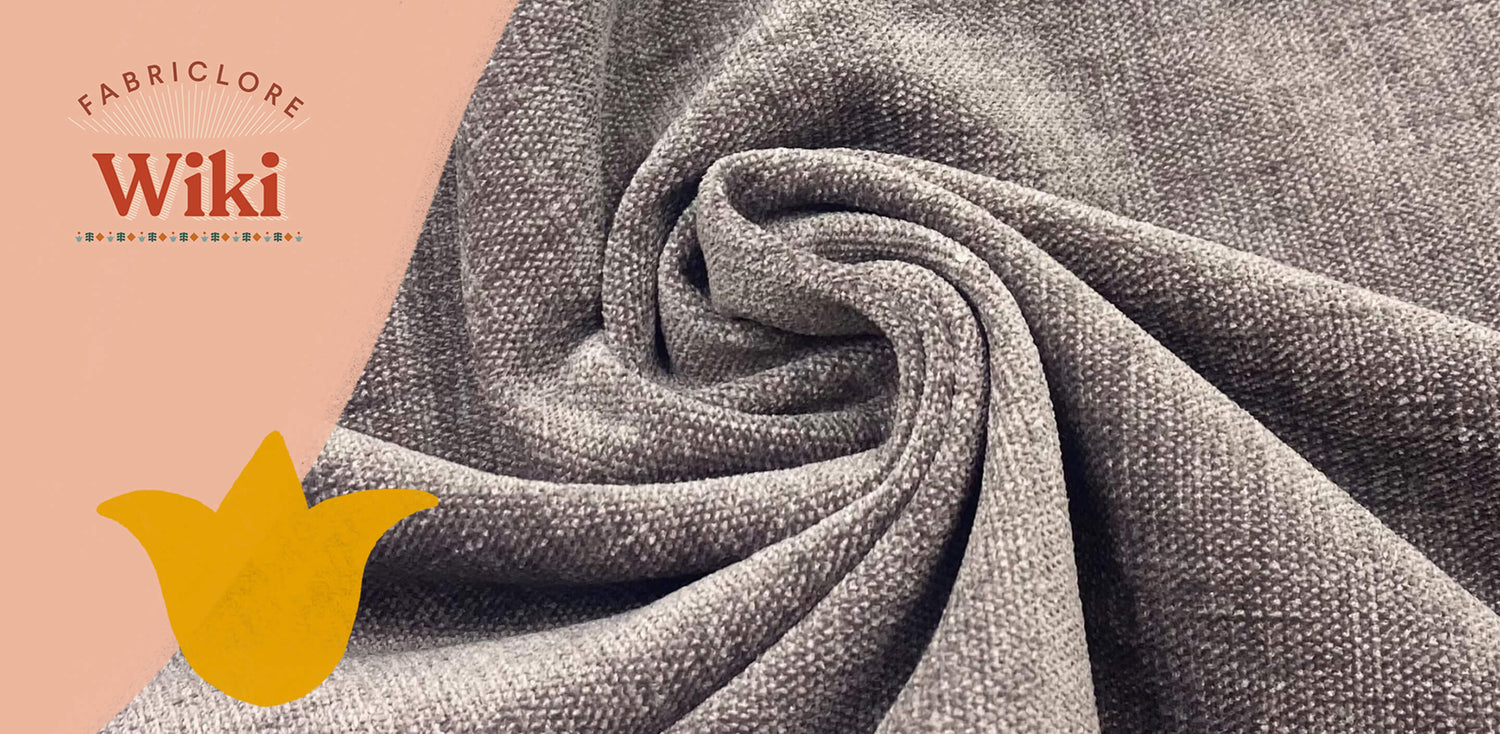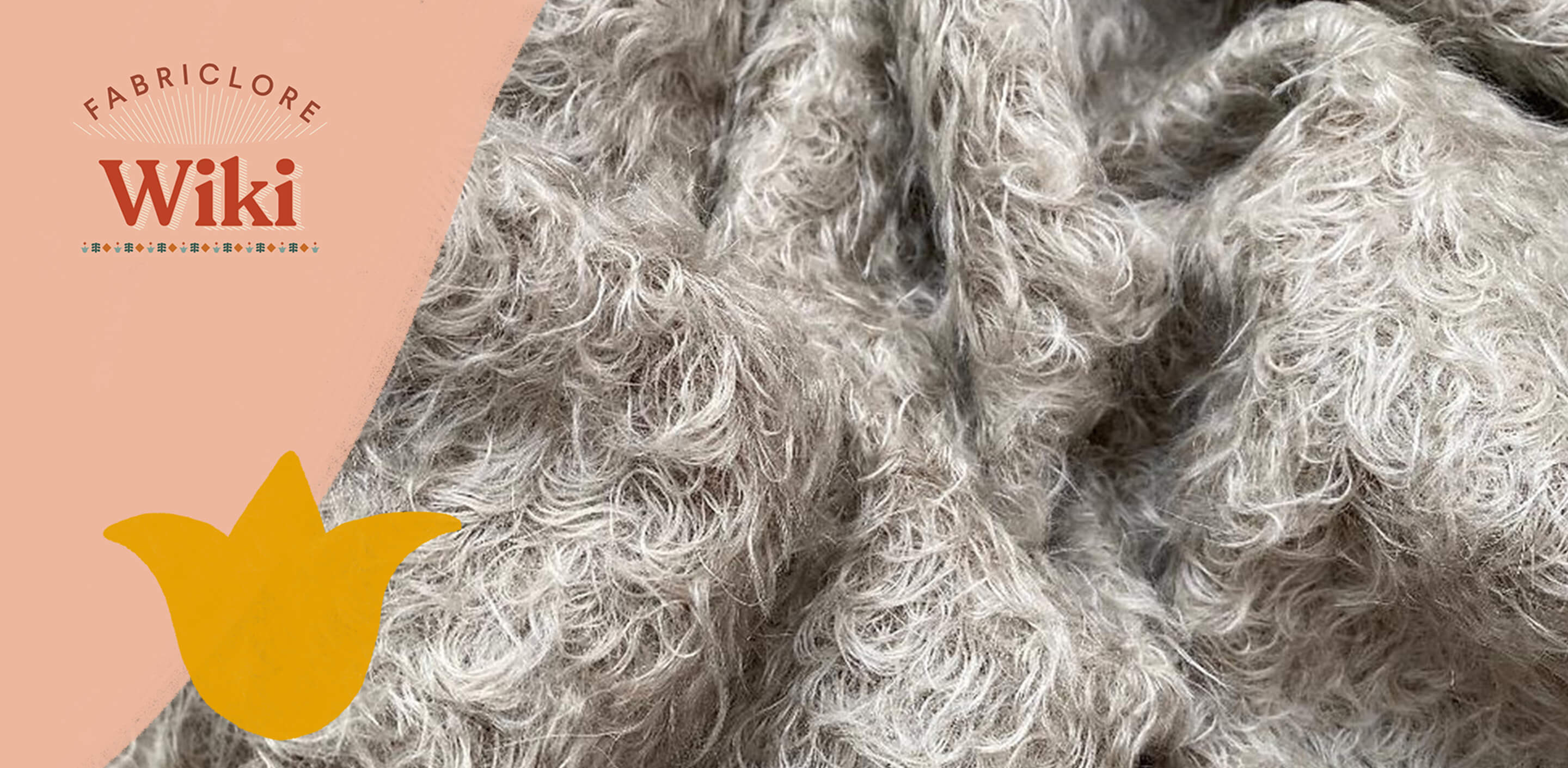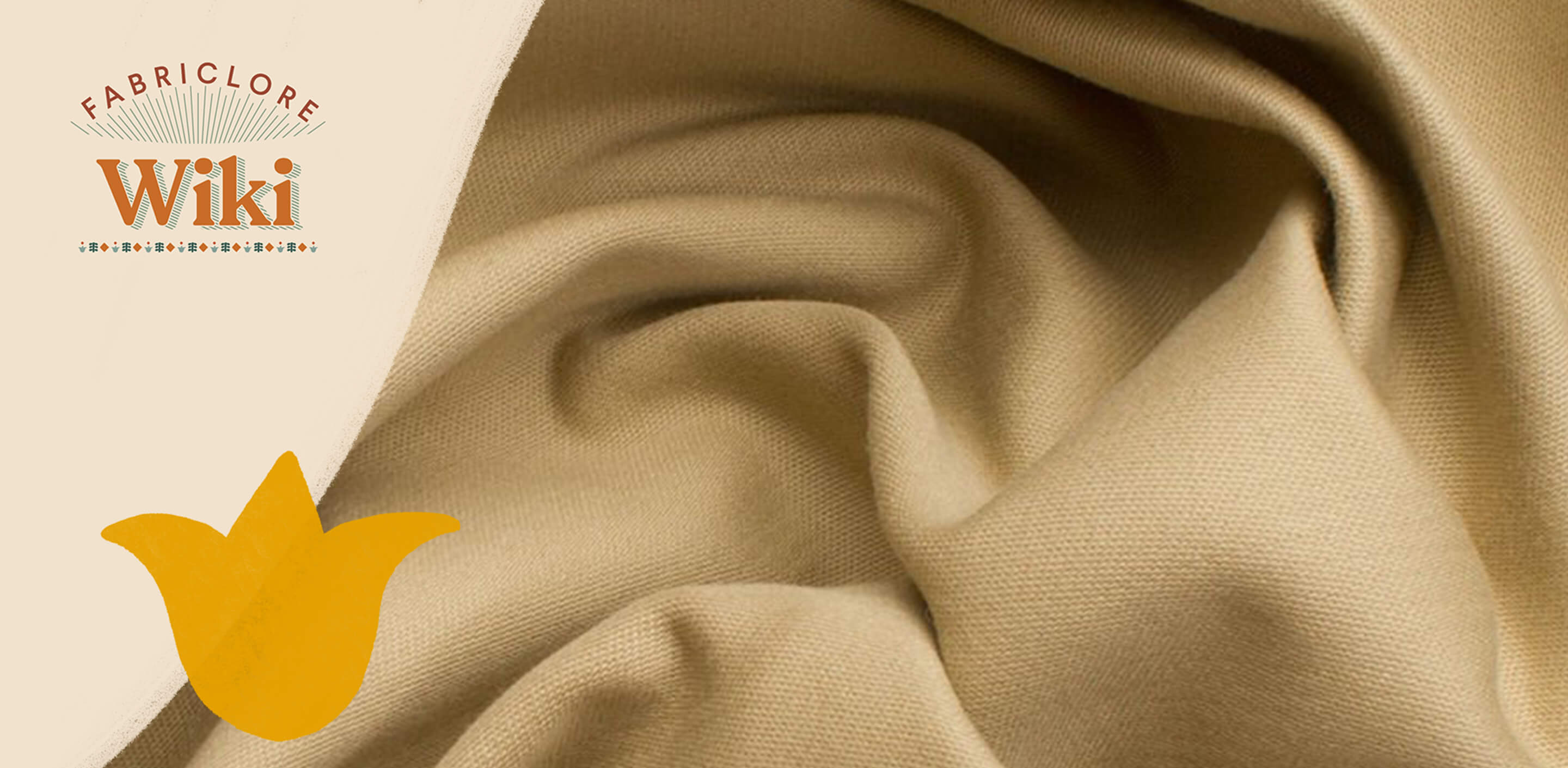Chenille fabric has a plush feel, is very soft, and has a light sheen, making it perfect for clothing, accessories, furniture, and home decor. If you're looking for chenille yarns, fabric for a knitwear line, or furniture weighting, this guide has it all: where the yarns come from, what they're made of, how they're made, technical specs, a strategy for finding yarns, uses, and how to take care of them.
What is Chenille Fabric?

"Caterpillar" in French refers to both a type of yarn and the fabric that is made from it. This yarn has a small pile, or fuzzy "hairs," that stick out from the centre. This gives the surface a soft, fuzzy feel.
The method started in France in the 18th century and was improved in Scotland in the 1830s for making fuzzy blankets. It was then used for furniture and clothing as well.
"Chenille fabric" in modern textile sourcing refers to fabric made from chenille yarn (or faux chenille) that is sewn or knitted into clothing, home decor, accessories, and yarn.
Key Characteristics of Chenille

Figuring out what makes chenille unique can help with fabric selection and design. After a summary, here are some specific bullet points outlining the core qualities.
Chenille fabric has a fuzzy, velvet-like surface, a soft hand, good drape (in many designs), and a fluffy look. It also requires special care when making, maintaining, and repairing it.
Key Properties:
- Plush, fuzzy texture — Chenille's short pile yarn gives it a silky feel and a sense of depth.
- Pile or fuzz-effect surface — Short pieces of fiber (called "piles") are twisted between two core yarns to make yarn. The loops are often cut to make a pile.
- Soft hand & cozy feel — Many brands like chenille because it feels pleasing to the touch.
- Variable weight & drape — Depending on the type of yarn used, the design (knit or weave), and the pile height, it can range from heavy upholstery to lighter clothing.
- Iridescent / light-reflective effect — Chenille can show small changes in tone when light hits it because of the way the pile is arranged.
- Compositional flexibility — You can use cotton fabric, rayon, polyester, acrylic, wool, mixes, and other materials to make chenille yarns and fabrics.
- Care & durability considerations — The pile surface might get snags, smooth, or pill; how it is maintained and used are essential.
Benefits for Apparel Brands & Textile Buyers
Chenille fabric can give brands, sourcing workers, and textile buyers a unique texture, a high-end look, and a way to set their designs apart. How to do it:
Brand & sourcing benefits
- Textural differentiation — Chenille gives fabrics depth, dimension, and a high-end feel that makes them stand out in clothing designs or high-end accessories.
- Versatility across categories — Chenille can be used for many things, from sweaters, cardigans, and scarves to trims on clothing and from home decor upholstery to soft furnishings.
- Colour & print potential — Modern chenille weaves can support bright colours, patterns, and mixes; they're suitable for capsules that follow fashion trends.
- Mid-luxury value proposition — Chenille fabrics can be marketed by brands as high-end-looking fabrics that don't have to cost as much as heavy silk or pure cashmere.
- Comfort & seasonal relevance — Chenille is ideal for warmer weather, as it has a soft feel and keeps you warm.
Direct benefits:
- Gives fabric or home decor lines a better hand-feel and structure.
- Suitable for making small amounts or capsules (especially knit chenille).
- It works well for trimmings, layers, uneven surfaces, and panels with strong contrast.
- Many fiber and composition choices, like cotton, polyester, acrylic, and blends, make finding easier.
- Colours, yarn blends, and finishes can be tailored to fit the brand identity.
- Lifestyle standing is improved (luxury home textiles, soft fashion, and cozy accessories).
Comparison Table – Chenille vs Related Fabrics
This short list of similarities between chenille and other related textures can help sourcing teams and designers decide when to use chenille.
|
Fabric |
Key Traits |
Best Use |
|
Chenille fabric |
Plush pile surface, soft hand, texture-rich, mid-to-heavy weight |
Sweaters, upholstery, throws, textured panels |
|
Smooth pile surface, high sheen, formal aesthetic |
Eveningwear, drapery, luxury upholstery |
|
|
Bouclé / boucle fabric |
Loop-y, textured surface, visually distinctive but less plush than chenille |
Casual jackets, textured knits, décor |
Types / Constructions Available
Chenille comes in many types based on use, fibre content, yarn construction, and finish. These are the most popular kinds.
|
Type |
Composition |
Texture & Appearance |
Common Uses |
|
Upholstery chenille weave |
Cotton, polyester, acrylic blends |
Heavy, dense pile surface, structured |
Sofas, cushions, curtains |
|
Knit chenille jersey |
Acrylic/wool blends, cotton |
Soft, flexible, sweater-knit texture |
Sweaters, cardigans, scarfs |
|
Apparel light-weight chenille |
Rayon / viscose blends |
Medium weight, softer hand, drapey knit |
Dresses, tunics, layering pieces |
|
Home textile boucle-chenille |
Wool blends or acrylic |
Less pile height, textured boucle feel |
Throws, blankets, decorative cushions |
|
Performance / outdoor chenille |
Polyester blends, acrylic |
Treated surface for durability / colour-fastness |
Lounge furniture, outdoor cushions |
GSM / Weight Guidance & Technical Specification
Important things to look for in chenille fabric are its weight, the way the yarn is made, the pile height, and its width. Brands and buyers should define these to make sure they work and are right for the job.
Texture, drape, insulation, and garment output are all affected by the chenille fabric's pile height and GSM weight. By giving the fabric the proper weight, you can be sure it will work for the intended purpose (clothing, upholstery, or accessories) and be cost-effective to produce.
GSM guidance table
|
GSM Range |
Indicative Description |
Ideal Applications |
|
200–300 GSM |
Lightweight chenille knit or woven |
Apparel layering pieces, scarves |
|
300–450 GSM |
Medium-weight chenille |
Sweaters, cardigans, light upholstery |
|
450–650 GSM |
Heavy chenille weave or upholstery grade |
Sofa upholstery, heavy throws, accessories |
Additional specs to define:
- Pile height (mm) – higher pile = more plush but heavier.
- Yarn count/twist – impacts hand and durability.
- Fabric width (inches/cm) – typical upholstery widths 54 "–60 ".
- Pile retention / rub-test rating – critical for upholstery or high-wear garments.
- Yarn composition – percentage cotton, acrylic, polyester, wool, etc.
How Chenille Fabric Is Made – Technical Process

Understanding manufacturing helps buyers assess quality, durability and sourcing reliability.
Chenille yarn is made by inserting short pile fibres between two core yarns, twisting them together and then cutting the loops at right angles which gives the fuzzy surface. The yarn may then be steamed to set the pile, and subsequently woven or knitted into fabric. Tight control is needed during the process to avoid loose piles and make sure the fabric lasts.
Production steps:
- Fibres selected (cotton, rayon, acrylic, wool or blends).
- Pile fibres carded, laid between two core yarns.
- Yarn twisted; loops created with pile fibres protruding.
- Loops may be cut (for specific effects) to create an exposed pile.
- Yarn steamed / heat-set (often includes low-melt nylon core for stability).
- Yarns knitted or woven into fabric, with the pile side facing the surface.
- Fabric finishing: brushing, raising, shearing to height, optional printing or dyeing.
Quality control is essential at every step. For end use, factors such as loose piles, snagging potential, colourfastness, and pilling resistance are crucial.
Applications by Category
Chenille fabric is used to make clothes, crafts, home art, and more. It is very important to match the type to the group of products.
|
Category |
Recommended Chenille Variant |
Key Benefits |
|
Apparel – Sweaters/Cardigans |
Knit chenille acrylic/wool-blend 300–450 GSM |
Soft hand, texture, seasonal warmth |
|
Apparel – Accessories |
Lightweight chenille 200–300 GSM |
Texture contrast, premium embellishment |
|
Home décor – Throws/Pillows |
Woven chenille 350–600 GSM |
Plush feel, decorative impact, durability |
|
Home décor – Upholstery |
Heavy weave chenille 500–650+ GSM |
Structure, resistance to wear, aesthetic plush |
|
Outerwear / trims |
Medium-weight chenille mix 300–400 GSM |
Visual texture, accent panels |
Sourcing & Specification Checklist
Brands and textile buyers should follow a structured process and ensure these key criteria are met when buying chenille fabric in bulk.
Please work with your mill or supplier to list the fiber content, yarn structure, pile height, weight, width, finish, and durability tests for the chenille fabric you want to make sure it fits your brand or production line. Getting swatches ordered and approved, ensuring lab tests are correct, and laying out the MOQ and wait times all help reduce risk.
Checklist:
- Fiber composition (e.g., 60% acrylic / 40% wool, or 100% cotton).
- Yarn count/twist, pile height in mm.
- Fabric weight (GSM), width (cm/in).
- Construction: knit vs weave, pile direction.
- Finish: brushing, shearing, heat-set.
- Durability tests: rub/generic abrasion, pilling rating, shrinkage.
- Colour/print requirements: Pantone matching, pattern repeat.
- MOQ & roll length; lead time for custom colours or designs.
- Shipping/delivery terms, quality-control procedure.
Care & Maintenance

Chenille needs proper maintenance for garments and décor due to its pile surface and texture.
If neglected, chenille's fuzzy surface can catch lint, snag, and flatten. Follow fabric/garment specifications, clean gently, and avoid direct sunlight and abrasion.
Care tips:
- Wash it by hand or on the gentle cycle of your washing machine. Cold water is best.
- Do not dry your clothes on high heat; instead, tumble dry low or flat dry.
- For upholstery, use a soft-bristled brush or a vacuum tool to remove dust and other dirt.
- Move pillows and throws around, even out to wear, and keep them out of direct sunlight to prevent fading.
- Heavy knit chenille shouldn't be hung over clothes; fold it instead to keep it from stretching.
- Clean up spills right away, but don't scrub, because that can hurt the pile.
Pros & Cons (Trade-Offs)
It's essential to weigh the pros and cons of chenille when choosing it.
Advantages:
- Plush texture and luxury feel.
- Substantial aesthetic impact and visual depth.
- Versatile across categories (apparel, accessories, home).
- Fibre/composition flexibility allows cost-performance optimisation.
Potential drawbacks:
- Susceptible to piling and flattening in high-traffic areas.
- Snagging or loose piles if the construction or finishing is weak.
- Maintenance may be higher compared to smooth fabrics.
- Visible wear or matting in areas of heavy use (e.g., armrests).
- Generally heavier weight → higher fabric consumption/cost.
Trends & Innovations
Chenille is evolving in the textile and clothing industry to keep up with new technologies, environmental concerns, and fashion trends.
Key trend areas:
- Eco-friendly blends: Incorporation of recycled polyester or cotton, low-impact dye processes.
- Lightweight chenille: Development of thinner piles and lighter constructions for transitional seasons.
- Digital printing on chenille: Enhanced patterning and colour capabilities on textured surfaces.
- Mixed-texture panels: Combining chenille with smooth fabrics (silk, satin) for contrast in garments.
- Performance finishes: Treatment for outdoor/indoor furniture uses, stain resistance, and fade resistance.
- Fashion applications: Chenille is used as statement textures in knitwear and varsity jackets, and for detailing in high-end fashion.
Final Thoughts

Chenille fabric isn't just a fuzzy material; it's also a sensory experience that can be used in many different ways. Chenille is a good choice for brands looking to enhance the feel of their products, make high-end accessories, or create unique sets of home textiles. But for an application to work well, it needs to be carefully planned, built well, and cared for so that it lasts and builds brand value.
You can get the most out of chenille fabric for everything from high-end knitwear to soft furniture by ensuring that the yarns used, fabric weight, construction type, and end use all align with your brand's goals.
FAQs
Q1. What Is Chenille Fabric Made Of?
Chenille fabric is made from yarns that are twisted so that the pile fibers are stuck between two core yarns. It can be made of wool, silk, cotton, acrylic, polyester, or a mix of these.
Q2. Is Chenille Suitable For Apparel Or Only For Upholstery?
Yes, chenille is used to make clothes like sweaters, cardigans, and scarves. It is also used to make throws, furniture, and home decor fabrics. There are many lighter versions suitable for fashion.
Q3. How Heavy Should Chenille Fabric Be For A Sweater?
For a sweater, look for chenille with a GSM of 300-450, the right pile height, and a knitted construction.
Q4. How Do I Differentiate High-Quality Chenille From Low-Cost Chenille?
A good chenille will have a well-set pile that isn't loose, a uniform yarn count and twist, good colourfastness tests, a pile height that is right for the job, and a core yarn that lasts. Swatches and lab results help prove quality.
Q5. How Should I Care For Chenille Fabric Garments Or Upholstery?
To keep cushions from wearing in the same way, wash them gently or have a professional clean them; avoid rough surfaces; let them dry in the breeze rather than direct sunlight; turn the cushions around; and do routine maintenance.
We also happen to be a magnet for suggestions, and would love to catch yours….throw us yours on hello@fabriclore.com




